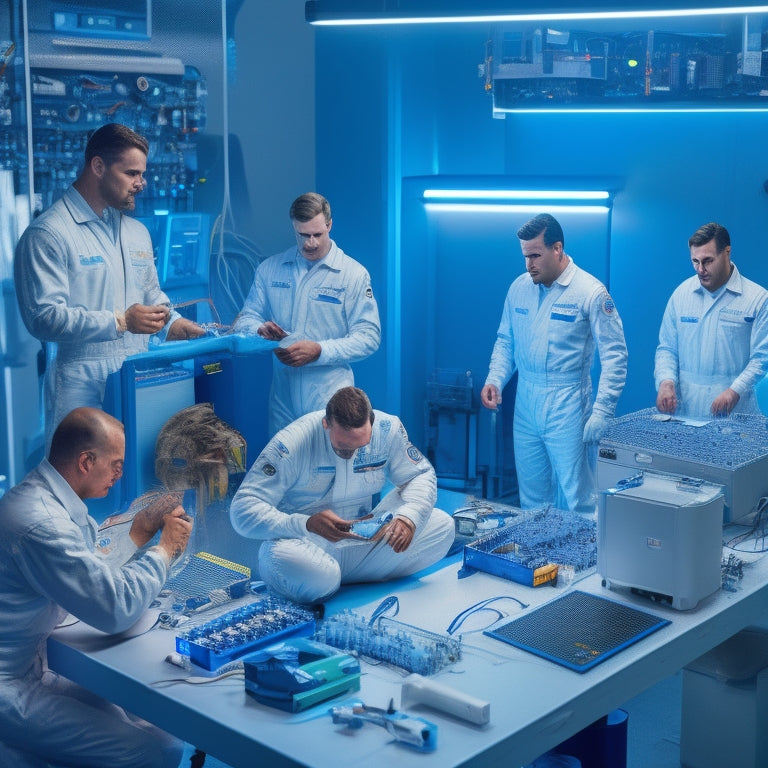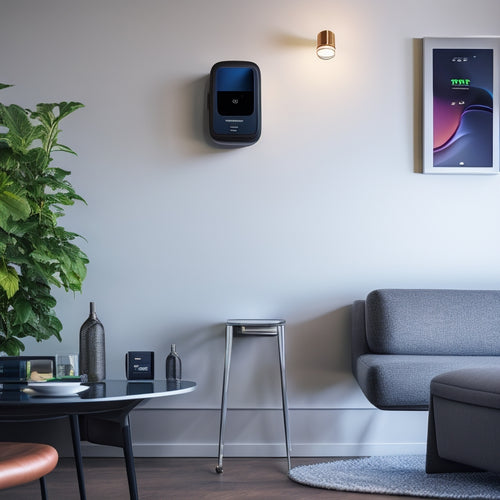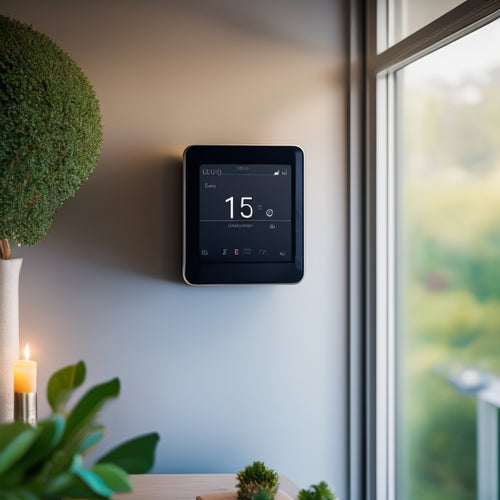
Ford Sets Standards for Electric Vehicle Repairs
Share
Ford's Electric Vehicle Certification sets a new standard for collision repair requirements, ensuring technicians have necessary training, tools, and equipment for safe and efficient electric vehicle repairs. The program includes completion of eight I-CAR courses, access to the Ford Workshop Manual, and possession of specific tools and equipment. Ford provides detailed training on electric vehicle repair procedures and safety standards, with online certification options available. To achieve high-quality repairs, technicians must follow original equipment manufacturer (OEM) procedures, which are essential for safety and preventing damage to vehicles and batteries. Further exploration reveals the depth of Ford's commitment to electric vehicle repair excellence.
Key Takeaways
• Ford's Electric Vehicle Certification ensures FCCN shops have necessary tools and training for electric vehicle repairs, meeting new industry standards.
• Eight I-CAR courses provide essential knowledge on electric vehicle repair procedures and safety standards for technicians.
• Access to the Ford Workshop Manual and industry EV safety requirements is mandatory for FCCN shops to ensure proper repair procedures.
• Recommended tools and equipment are crucial for safe and efficient electric vehicle collision repairs, avoiding damage to high-voltage batteries.
• Adherence to OEM procedures is crucial for electric vehicle repairs, ensuring technician safety and preventing damage to vehicles and batteries.
Ford's Electric Vehicle Certification
Ford's Electric Vehicle Certification is an all-encompassing program that sets a new standard for collision repair requirements. This certification guarantees that Ford Certified Collision Network (FCCN) shops are equipped with the necessary tools and training to safely and efficiently repair electric vehicles.
The certification process includes the completion of eight I-CAR courses, providing technicians with essential knowledge on electric vehicle repair. Additionally, access to the Ford Workshop Manual and industry EV safety requirements are obligatory.
Shops seeking certification must also possess specific tools and equipment to meet the repair requirements. By meeting these requirements, FCCN shops can ensure that electric vehicles are repaired safely and efficiently, thus upholding Ford's high standards for quality and safety.
Training and Information for BEV
To guarantee technicians are equipped with the knowledge required for safe and efficient electric vehicle repairs, Ford has established a detailed training program that includes eight I-CAR courses, providing a solid foundation in electric vehicle repair procedures and industry safety standards.
This thorough training ensures technicians are well-versed in BEV repair procedures, adhering to industry safety standards. The online certification options offer convenience and flexibility, allowing technicians to complete the courses in approximately 60 minutes each.
Access to the Ford Workshop Manual is essential, as it provides the necessary resources for proper repair procedures. Ford's BEV training resources provide a strong foundation for technicians, enabling them to confidently tackle electric vehicle repairs with precision and control.
Tools and Equipment for Repairs
Recommended tools and equipment are essential for guaranteeing safe and efficient electric vehicle collision-related repairs, as they enable technicians to perform tasks effectively and avoid damaging high-voltage batteries. Ford provides access to necessary resources, including the Ford Workshop Manual, to ensure proper repair procedures. Shops without necessary tools can collaborate with Ford or Lincoln Electric Vehicle Certified Dealer Program.
The following equipment is vital for safe and efficient repairs:
-
Safety gear: High-voltage gloves and electrical safety rescue hook
-
Repair equipment: Proper tools for HVB removal to avoid damage
-
Personal protective equipment: Additional tools and equipment can be found on rotunda.service-solutions.com
Collaborative Training and Development
Through its collaboration with I-CAR, Ford has developed a thorough training program that guarantees technicians receive up-to-date and relevant training for electric vehicle repairs. This collaborative innovation enables technicians to stay current with the latest industry developments, ensuring they possess the necessary skills to perform high-quality repairs.
The training program is part of I-CAR's Professional Development Program 2.0, comprising eight courses that provide in-depth knowledge on electric vehicle repair. Ford's commitment to industry partnerships and collaborative innovation ensures that technicians are well-equipped to handle the complexities of electric vehicle repairs, ultimately enhancing the overall repair experience for customers.
Importance of OEM Procedures
Every electric vehicle repair demands adherence to original equipment manufacturer (OEM) procedures to guarantee the safety of technicians and prevent damage to vehicles and batteries. Deviation from OEM guidelines can result in severe consequences, including electrical shock, fire, or even death.
To verify compliance with repair standards, technicians must follow OEM procedures for high-voltage battery removal, electrical system repairs, and other critical tasks.
Here are three key reasons why OEM procedures are essential:
-
Safety: OEM procedures ensure the safety of technicians and prevent electrical shock, fire, or other hazards.
-
Quality: Following OEM guidelines ensures quality repairs that meet manufacturer standards.
-
Liability: Adhering to OEM procedures reduces liability risks for repair shops and technicians.
Frequently Asked Questions
Can Independent Shops Obtain Ford Electric Vehicle Certification?
Independent shops can achieve Ford Electric Vehicle Certification by completing the requisite eight I-CAR courses, meeting regulatory hurdles, and adhering to industry standards, tapping into business opportunities while ensuring environmental benefits through proper EV repairs.
Are All I-Car Courses Required for BEV Certification Available Online?
"Fortunately, in this digital age, all I-CAR courses required for BEV certification are conveniently available online, offering virtual classroom accessibility and remote training, ensuring technicians can acquire necessary skills from the comfort of their own digital learning space."
How Often Should Technicians Complete Refresher Training for BEV Repairs?
To mitigate skill decay, technicians should complete refresher training for BEV repairs at regular intervals, ideally every 12-18 months, to guarantee proficiency in evolving electric vehicle technologies and maintenance of OEM certification standards.
Will Ford Provide Financial Assistance for Shops to Purchase Required Tools?
Ford has not explicitly stated provision of financial assistance or tool subsidies for shops to purchase required tools, leaving owners to absorb costs, potentially impacting adoption of electric vehicle certification requirements.
Can Certified Shops Display the Ford Certified Collision Network Logo?
"Practice makes perfect," and for certified shops, displaying the Ford Certified Collision Network logo is a badge of honor, offering logo benefits and enhanced brand recognition, signifying expertise in electric vehicle repairs.
Related Posts
-

7 Best EV Battery Health Trackers for Homeowners
You can maximize your electric vehicle's performance and lifespan by leveraging advanced battery health trackers that...
-

Smart Energy: Greener Homes With Connected Power Devices
You can control and optimize your energy consumption with smart energy devices, reducing your carbon footprint by up ...
-

3 Green HVAC Filters for Solar-Powered Homes
When outfitting your solar-powered home with an HVAC system, you'll want to choose filters that align with your commi...


